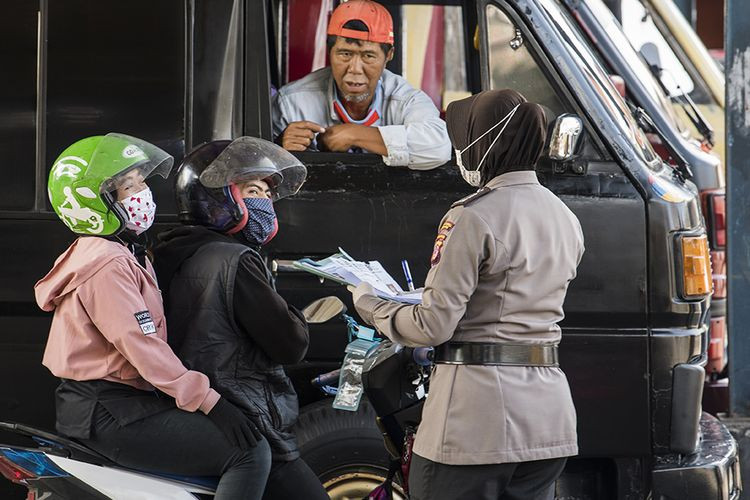Popular Reads
Top Results
Can't find what you're looking for?
View all search resultsPopular Reads
Top Results
Can't find what you're looking for?
View all search resultsGreater Jakarta to expand restrictions as existing measures deemed ineffective
Change text size
Gift Premium Articles
to Anyone
T
he large-scale social restrictions (PSBB) imposed in Greater Jakarta are set to be extended and expanded, leaders of the capital city’s satellite cities have said, as the lack of legal certainty and the continued spread of COVID-19 have underlined the policy’s ineffectiveness in curbing the disease.
The PSBB measures in Greater Jakarta officially began in the capital on April 10, followed closely by West Java’s Bogor, Bekasi and Depok administrations on April 15 and Banten’s South Tangerang and Tangerang administrations on April 18.
However, the number of confirmed infections in Greater Jakarta continues to rise in spite of unprecedented social restrictions.
As of Monday, Jakarta recorded 3,869 cases and 367 deaths. West Java and Banten, which partly make up the Greater Jakarta region, had registered 951 and 78, and 382 and 40, confirmed cases and deaths, respectively.
Jakarta Governor Anies Baswedan announced last week that the capital's PSBB status would be extended until May 22, “as the number of COVID-19 cases continues to increase at a rate that is relatively constant”.
The Health Ministry regulation used to impose the measures stipulates that restrictions can be extended beyond the existing period so long as there is proof of a continued outbreak.
During the first term of large-scale social restrictions, authorities still found numerous instances of gatherings of more than five people and commuters still flocked to and filled up public transportation.
In the case of commuters, many are still expected by their employers to go into the workplace on a regular basis, bypassing official orders to shelter in place.
This is partly because the Industry Ministry has allowed hundreds of offices and factories – including those outside essential sectors – to continue with business-as-usual operations.
Such “contradictory” policies have become a major concern for leaders of Greater Jakarta's satellite cities, in particular the five local administrations, abbreviated as “Bodebek”, in West Java, which are set to end their first run of PSBB measures on April 28.
The deputy mayor of Bogor city, Dedie Rachim, told The Jakarta Post on Monday that Bodebek leaders had agreed to propose an extension of PSBB for each of their regions.
“The PSBB in Bodebek lacks effectiveness because of the lack of public awareness, unclear regulations and contradictory policies between the central government and the local administrations,” he said, citing results of a virtual meeting of Bodebek leaders held on Sunday.
Reflecting Jakarta’s case, PSBB measures had been largely ineffective because of conflicting policies at the ministerial level, Dedie said, noting the recent flip flop in decision making over commuter railway services and business sector closures.
They urged the central government to evaluate ministerial policies so they do not overlap.
“The five leaders of Bodebek will continue to propose to the Transportation Ministry to temporarily cease operations of the commuter railway line during PSBB, or at least to close down certain stations and filter those who are allowed to use the services,” he said.
Bogor Regent Ade Yasin expressed a similar sentiment.
Only around 30 percent of Bogor residents abide by the PSBB rules, while the number of red zones in the regency had increased from 13 to 17, rendering the measures ineffective in breaking the chain of transmission in Greater Jakarta.
“Many of those who have been infected [continued to] work in Jakarta,” she said in a virtual discussion on Saturday, noting that the preferred method of transportation was still the commuter railway.
“The spread of the virus is massive in the areas served by the commuter line.”
Ade also criticized the central government’s inability to impose clear regulations with regard to the PSBB. One example of this was the Industry Ministry’s insistence that physical retailers stay open until 10 p.m., whereas Bogor regency has placed restrictions on opening hours until 8 p.m.
“We face a dilemmatic situation. One side is trying to implement the PSBB while the other side is loosening restrictions,” she said. “All we need is legal certainty.”
Meanwhile, Bekasi Mayor Rahmat Hidayat said that social restrictions in his region were deemed ineffective because of a lack of punitive measures. The city had so far only reprimanded violators.
Jakarta's satellite cities in Banten, set to end their PSBB on May 1, have yet to conclude whether to extend restrictions in their regions.










